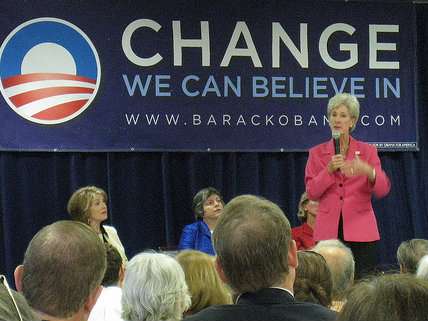No, Obamacare Doesn't Deserve Credit for Slowing the Growth of Health Spending

For the fourth year in a row, Medicare's actuaries reported that total national health spending—encompassing public and private payers—grew modestly. In 2012, total national health spending just 3.7 percent, with the share of the economy devoted to health spending falling slightly from 17.3 percent down to 17.2 percent. National health spending still grew, in other words, but the economy grew faster.
The White House spin, as in previous years, is that Obamacare deserves credit for restraining the nation's health spending growth. But at the very least, it's too early to tell. And there's reason to believe that the lingering effects of the recession and other shifts in the health sector have far more to do with the slowdown than the health law.
"For years, healthcare costs in America skyrocketed, with brutal consequences for our country," notes administration health policy deputy Jeanne Lambrew at the White House blog. But Obamacare, "for the first time in decades, has helped to stop the trend."
That's not quite right. The slowdown actually began several years prior to Obamacare, during the Bush administration. Health spending growth came in at 9.7 percent in 2002, and started declining the year after. Spending growth then took a nosedive between 2007 and 2009, dropping from 6.3 percent to 3.8 percent. Notably, that was before Obamacare was passed, but coinciding with the recession. Health spending growth has hovered at basically the same level since.
So the trend started years before Obamacare, and the biggest effect coincided with the recession—not the passage of the law. The president's health law arrived on the scene late, after the major changes had already taken place—but the White House wants credit anyway.
The officials who wrote the report say they can't have it, at least not yet. As Medicare Trustee Charles Blahous pointed out recently, following passage of the law in 2010, the program's financial analysts projected that it would increase health spending through 2016. Medicare did revise its growth projections downward, but the factors it cited were all unrelated to Obamacare.
Indeed, Medicare's officials are once again warning against conclusions that declare Obamacare the driver of the slowdown.
"The relatively low rates of growth that we've seen over the last four years are consistent with the historical trends that we've seen when we look at health spending and gross domestic product," Aaron C. Catlin, one of the report's coauthors, said according to The New York Times. "The relatively low rates of growth that we've seen over the last four years … are consistent with what we've seen in post-recessionary periods in the past," Catlin also noted.
Obamacare may be having a small effect on health spending growth at the margins, and it's possible it will have a bigger effect in years to come. But the bulk of the slowdown so far is more likely a result of the recession over the last few years and significantly increased adoption of consumer-driven health plans in the years prior to the economic downturn.


Show Comments (96)